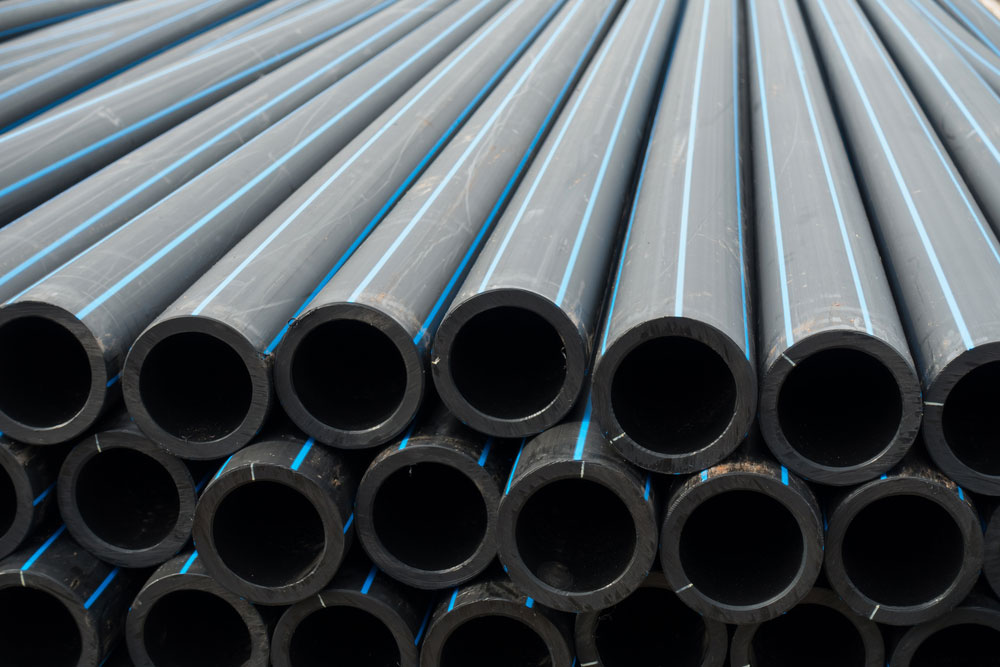How American Plastics HDPE Pipe for Oilfield Supports Energy Infrastructure
Wiki Article
Recognizing the Secret Perks of HDPE Pipeline for Water and Wastewater Administration
Using HDPE pipeline in water and wastewater monitoring provides numerous advantages that merit factor to consider. Its outstanding resilience and long lifespan make it a recommended selection for numerous jobs. Furthermore, the material's resistance to rust and chemical damages enhances its dependability in numerous settings. Nevertheless, the advantages extend past just durability and resistance. Exploring its cost-effectiveness and environmental impact discloses much more engaging reasons for its prevalent fostering in modern-day facilitiesExceptional Toughness and Durability

HDPE pipeline attracts attention for its exceptional toughness and durability, making it a favored option in water management systems. Constructed from high-density polyethylene, these pipes can withstand significant stress and stress, ensuring trustworthy performance over time. Their durable nature permits them to sustain severe environmental conditions, including temperature variations and dirt activities, which can create other materials to stop working.
The life-span of HDPE pipelines frequently exceeds 50 years, offering a cost-effective service for districts and sectors alike. Additionally, the product's lightweight properties streamline installment, minimizing labor costs and timeframes. This toughness decreases the demand for constant repair work or substitutes, even more improving its financial charm.
In water monitoring applications, the integrity of HDPE pipelines implies fewer disturbances and enhanced solution continuity, making them indispensable to sustainable infrastructure advancement. The mix of resilience and long life strengthens HDPE's duty as a cornerstone in reliable water administration options.

Resistance to Rust and Chemical Damages
While several products surrender to corrosion and chemical damages gradually, HDPE pipelines show remarkable resistance, making them ideal for various water management applications. This strength stems from the molecular framework of high-density polyethylene, which is inherently non-reactive and does not corrode like steels or deteriorate from exposure to severe chemicals. Consequently, HDPE is extremely efficient in environments with hostile compounds, such as wastewater systems that may consist of acids, bases, and organic solvents.
In addition, HDPE pipes can stand up to environmental elements such as soil level of acidity and saline conditions, even more enhancing their suitability for varied applications (custom hdpe pipe manufacturing Midland TX). Their capacity to maintain structural honesty with time reduces the threat of leaks and failures, which is crucial in ensuring the safety and dependability of water circulation and wastewater management systems. The resistance to corrosion and chemical damage markedly contributes to the overall performance and longevity of HDPE piping options.
Cost-Effectiveness and Financial Advantages
When thinking about the financial effects of water administration systems, the cost-effectiveness of HDPE pipes becomes apparent. These pipelines supply reduced installment and upkeep prices compared to conventional products like metal or concrete. Their light-weight nature streamlines transport and installation, leading to decreased labor expenses. In addition, HDPE pipes exhibit a lengthy life-span, frequently going beyond 50 years, which equates to fewer substitutes and long-term savings.The resistance of HDPE to corrosion and chemical damages minimizes the demand for expensive repairs and substitutes. The pipes also support effective water flow, decreasing energy expenses related to pumping systems. By mitigating leaks and water loss, HDPE pipelines contribute to considerable financial advantages for towns and markets alike. Overall, the initial investment in HDPE piping can produce considerable monetary returns over the life-span of the water monitoring system, making it a sensible choice for lasting framework advancement.
Ecological Sustainability and Reduced Influence

Convenience and Flexibility in Installation
Since of their distinct homes, HDPE pipelines provide amazing flexibility and flexibility in installment, making them suitable for a variety of applications. Their lightweight nature permits for much easier handling and transport, reducing labor costs and installation time. HDPE pipelines can be bent and shaped to fit various terrains and task demands, which is specifically useful in testing environments.Furthermore, their resistance to rust and chemical damages allows for installation in varied setups without the need for specialized safety layers. The capability to fuse joints develops a continual, leak-free system, boosting the total integrity and integrity of the installation. HDPE's versatility likewise fits ground activity, lowering the threat of damage in locations prone to shifting soil. Generally, these attributes make HDPE pipes not only functional however also Pipe Supplier American Plastics Midland a preferred choice for water and wastewater monitoring systems.
Regularly Asked Concerns
How Does HDPE Pipe Compare to PVC in Water Management Applications?
HDPE pipe uses remarkable versatility, resistance to deterioration, and resilience contrasted to PVC. Its lighter weight helps with easier setup, while its long life expectancy minimizes replacement expenses, making HDPE a favored selection in water monitoring applications.What Is the Lifespan of HDPE Pipeline Under Typical Conditions?
Under regular conditions, HDPE pipes can have a life expectancy varying from 50 to 100 years. Their sturdiness and resistance to rust add to their lasting performance in different applications, making them a reputable selection for framework.Are HDPE Piping Recyclable After Their Life Span?
Yes, HDPE pipelines are recyclable after their solution life. Texas hdpe pipe manufacturer. They can be processed and repurposed right into new items, significantly reducing environmental effect and advertising sustainability within the market, making them an eco-friendly selection for piping optionsWhat Is the Installment Process for HDPE Pipes?
The installation procedure for HDPE pipes entails site prep work, trenching, pipe blend or mechanical joining, backfilling, and stress testing. Appropriate strategies guarantee a resilient and reliable system for carrying water and wastewater properly.Can HDPE Piping Be Used for Both Drinkable and Non-Potable Water Equipments?
Yes, HDPE pipes can be utilized for both safe and clean and non-potable water systems. Their versatility, toughness, and resistance to deterioration make them appropriate for numerous applications, making sure risk-free and effective transport of water in various contexts.Report this wiki page